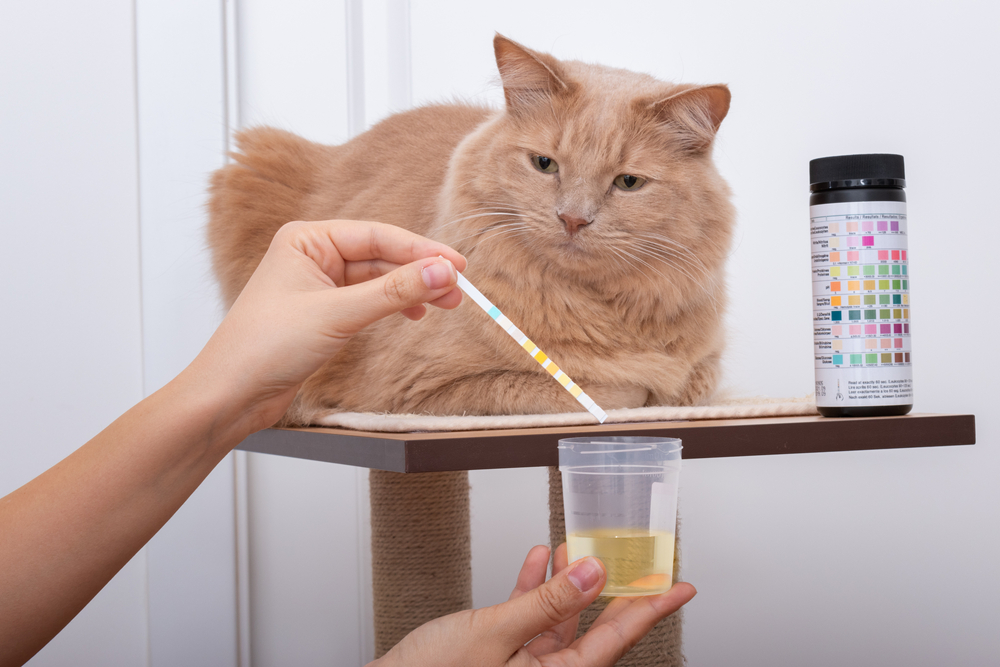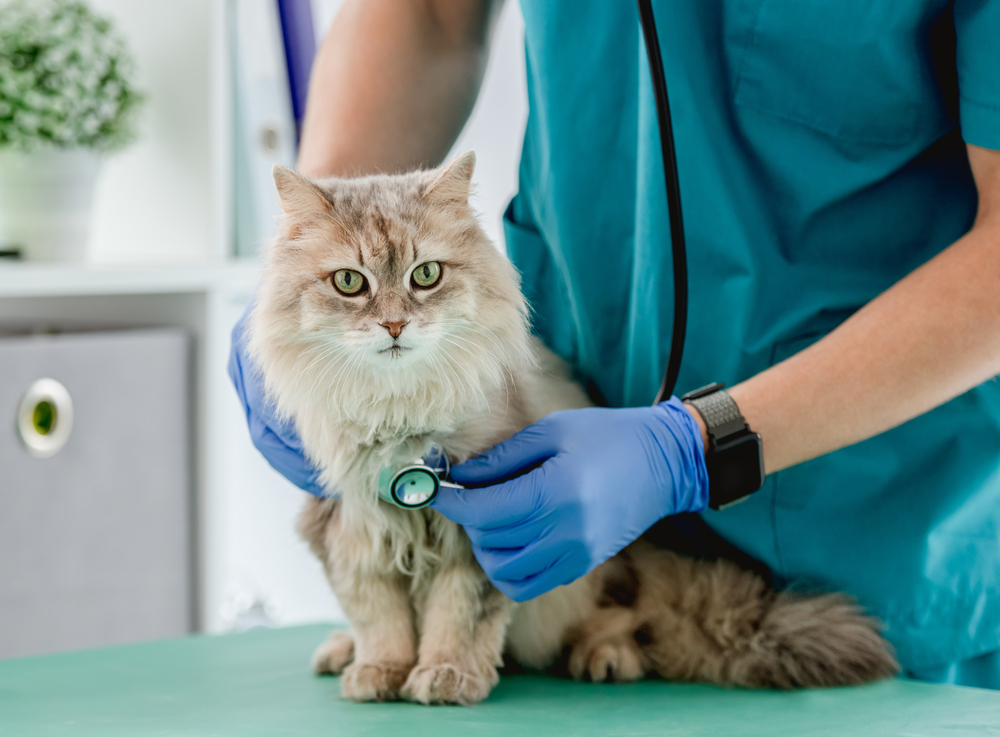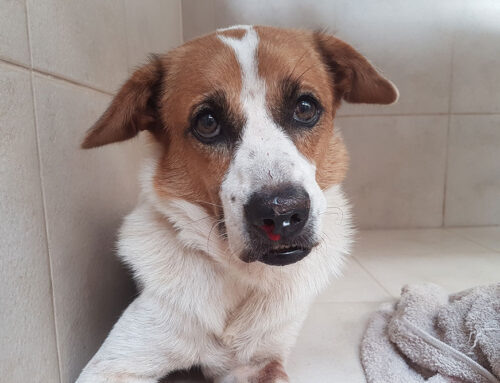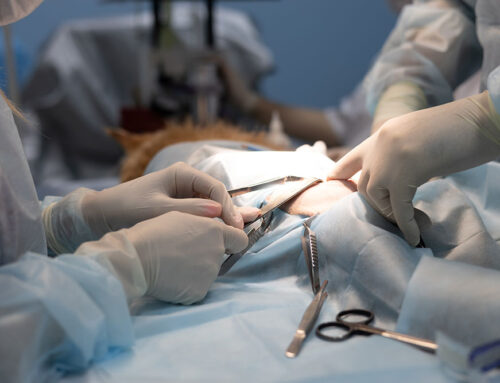Cats are masters at hiding illness. This natural tendency stems from their wild ancestors, who adapted the trait because exhibiting vulnerability could be detrimental to their longevity. This makes yearly veterinary care important for your cat to detect health issues, and older cats require more frequent veterinary attention, since they are at higher risk for many diseases. Our team at North Waterloo Veterinary Hospital wants to explain why regular wellness exams are essential to keep your cat happy and healthy.
Important information is learned when we take your cat’s history
A routine wellness exam begins with a thorough history. We will ask how your cat is acting, what and how well they are eating, how well they are drinking, if their litter box habits are normal, if anything has changed in their environment, and if their sleeping habits have changed. You may think that an occasional litter box indiscretion or vomiting episode is normal for your cat, but these actions can indicate a serious health issue. Their history helps our veterinary professionals know if the signs your pet has been exhibiting in their home environment are concerning, and whether further diagnostics are needed. These discussions are also a great time for you to ask any questions about your cat.
Important information is learned when we weigh your cat
We will weigh your cat and evaluate their body conditioning score (BCS) to determine their weight status. Approximately 50% to 60% of pets are overweight in Canada, and your cat’s coat may mask the few extra pounds they have gained. Obesity is a serious problem that puts your cat at higher risk for health issues such as cancer, diabetes, heart disease, kidney disease, and arthritis. If we determine your cat is overweight, we will formulate a safe weight loss plan to help them lose the excess pounds.
Important information is learned when we perform a physical exam on your cat
A wellness exam includes a detailed physical exam, and we will closely evaluate your cat from nose to tail.
- Eyes — We will examine your cat’s eyes using an ophthalmoscope, to detect conditions such as cataracts, retinal abnormalities, and glaucoma.
- Ears — We will examine your cat’s ears using an otoscope, to identify conditions such as ear infections, ear polyps, and parasites.
- Mouth and teeth — We will examine your cat’s mouth, looking for conditions such as periodontal disease. The majority of pets have some degree of periodontal disease by 3 years of age, and the bacteria behind this condition can cause loose, painful teeth, tooth root abscesses, and organ damage, if the bacteria infect your cat’s bloodstream. If your cat is affected, we will recommend a professional veterinary cleaning to address the problem.
- Coat — We will assess your cat’s skin and coat for hair loss and skin changes, which can indicate metabolic conditions. If abnormalities are seen, we may recommend further diagnostics.
- Heart — We will auscultate your cat’s heart, listening for murmurs or arrhythmias that may indicate a heart condition. If we hear an abnormality, we will likely need further evaluation of your cat with diagnostics, such as a chest X-ray or ultrasound.
- Lungs — We will also auscultate your cat’s lungs, listening for any abnormalities that could indicate a lung disease.
- Abdomen — We will palpate your cat’s abdomen to ensure their organs are normal size, and to check for abdominal masses.
- Limbs — We will carefully evaluate your cat’s limbs and joints. International Cat Care estimates that 60% to 90% of cats older than 12 suffer from arthritis, but owners frequently don’t recognize that their cat is affected. Our veterinary professionals can detect this painful condition to ensure your cat receives the treatment they need.
- Paws — Older cats are at higher risk for ingrown nails, because they tend to be less active. We can detect and correct this issue before infection occurs.
Important information is learned when we perform blood work on your cat
A routine wellness exam includes blood work such as a complete blood count and a biochemistry profile. These tests provide valuable information that can help detect many diseases.
- Complete blood count (CBC) — A CBC evaluates your cat’s red and white blood cells and their platelets. Conditions, such as infection, anemia, and a diminished immune response, can be detected.
- Biochemistry profile — A biochemistry profile evaluates several body systems and organs. Conditions, such as kidney failure, liver disease, and diabetes, can be detected.
- Thyroid panel — Older cats are at higher risk for hyperthyroidism, which can lead to significant health issues. We may recommend a thyroid panel if your cat is older than 6 years of age.
Important information is learned when we perform a urinalysis on your cat

We assess your cat’s urine, evaluating the color, acidity, concentration, and content. Conditions such as urinary crystals, diabetes, kidney disease, and urinary tract infections can be identified.
Yearly wellness exams are important to ensure your cat remains healthy. Cats who are older than 6 years of age should be evaluated every six months, since they are at higher risk for many diseases. Wellness exams help catch feline health issues in the early stages when they can be easier to treat and manage. If you would like to schedule a wellness exam for your cat, contact our team at North Waterloo Veterinary Hospital, so we can help ensure your cat’s quality of life remains optimal.







Leave A Comment